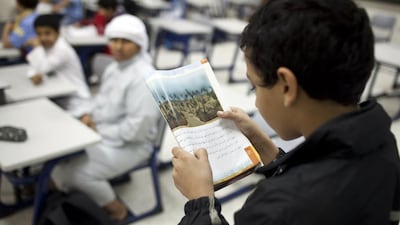DUBAI // The English language is “seducing” pupils, leaving them unable to properly speak and write in Arabic by the time they arrive at university, a conference heard on Monday.
“We have been for years telling our children you have to love the Arabic language but we don’t present that language to them in a friendly way,” Dr Lana Mamkegh, Jordan’s minister of culture, told a panel on the status of Emirati youth. “The curriculum that is being adopted is far from attractive for our children.
“We can see our children are comparing between the really seductive English language and the non-attractive Arabic language because we are presenting these languages wrongly.”
Panellists at the First Knowledge Conference called for more use of Arabic in public institutions and praised the Government for putting the language high on the agenda.
The FNC is planning a federal law to protect the mother tongue by making it the language of instruction in public schools.
“The problem is the UAE is a cosmopolitan society and the national population is very small,” said Dr Sulaiman Al Jassim, former Zayed University president.
“That’s why we see the English language dominating in all business, in all banking. That affects radically the language in schools.
“Nationals take their children to private schools where they teach English and those boys and girls go to university and their Arabic language is very weak.”
The Arab Knowledge Report 2014, which was released at the forum, confirmed that language continued to be a challenge for Emiratis.
“Preserving the native Arabic language in the UAE means preserving the identity of the society and culture,” says the annual report, which was conducted by the Mohammed bin Rashid Al Maktoum Foundation in partnership with the UN Development Programme.
The report surveyed 2,142 students from UAE University, Zayed University and the Higher Colleges of Technology. Researchers measured their skills in areas such as problem-solving, communications, technology and other skills.
When it came to their Arabic writing skills, the students’ mean score was 11.09 out of 20, indicating an “average” performance or “about the minimum required,” the report says. Only two of the students achieved a score of 20.
“This is a cause for concern,” the report noted. “All of the above strongly calls for the need to work on developing the written and communication skills of young Emiratis, not only at the university level but also more essentially during their earlier fundamental stages.”
Arabic is critical to preserving and advancing Emirati culture, customs and traditions, said Kaltham Al Maged, assistant professor at the Institute for Islamic World Studies at Zayed University.
“There is what you may call a linguistic conflict,” said Prof Al Maged. “Our students study English at great lengths, thus leading to English really superseding Arabic.
“This does pose a problem because the UAE youth may not have the language he or she requires to transfer knowledge in a proper way.
“So I believe we should start improving our Arabic language and teach Arabic so that we could be more successful in the transfer and localisation of knowledge.”
rpennington@thenational.ae

